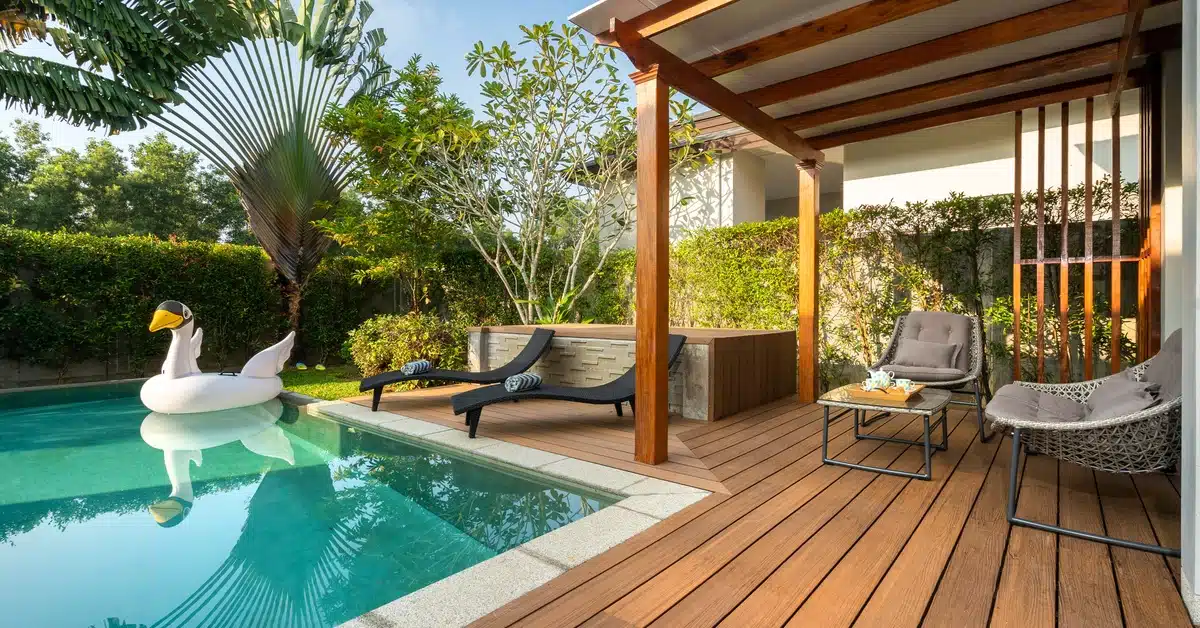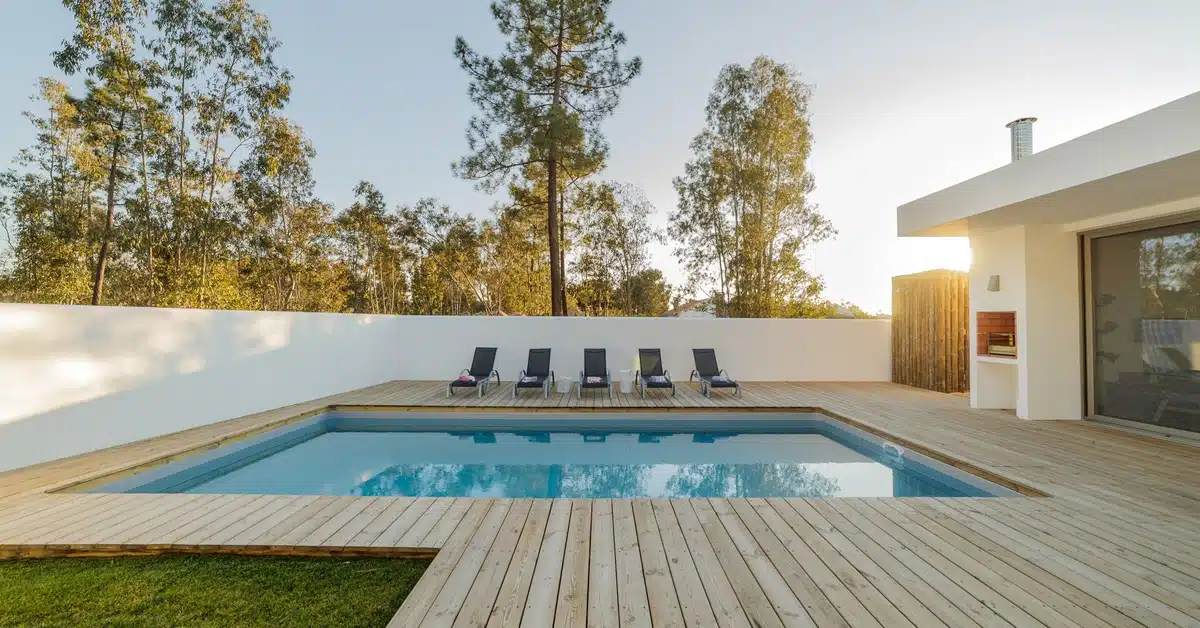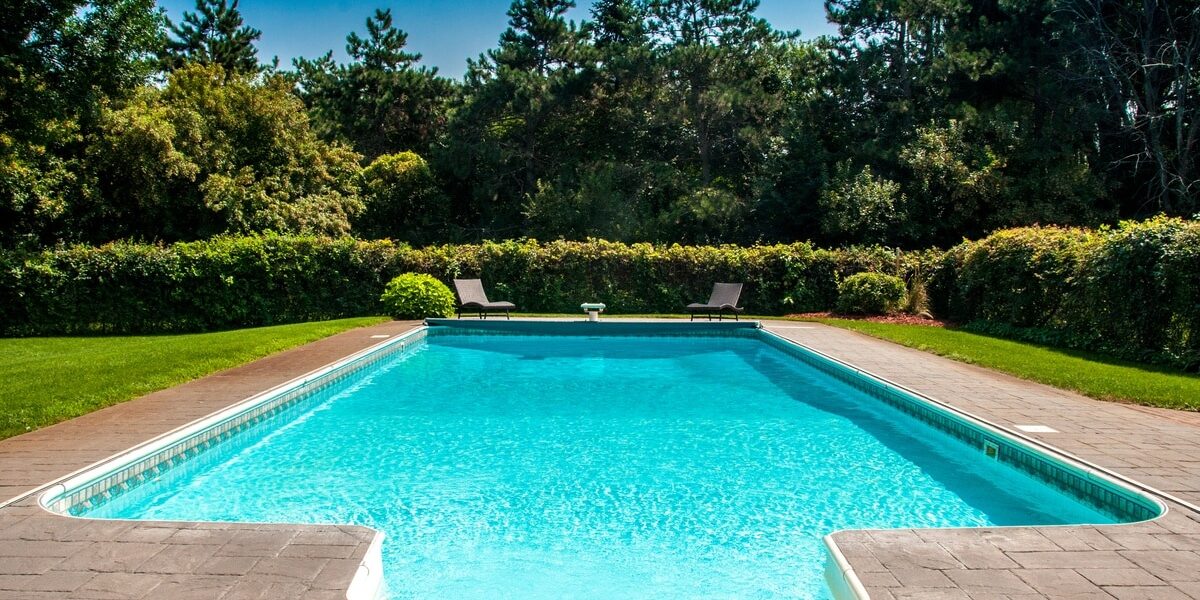High water consumption, energy-intensive filtration systems, and chemical-heavy maintenance have given pool ownership a reputation for being environmentally unfriendly. Creating an eco-friendly pool doesn’t mean sacrificing the enjoyment and relaxation you expect from your investment. Modern pool construction offers numerous opportunities to create stunning backyard oases that work with nature rather than against it.
Smart material choices, innovative water conservation techniques, energy-efficient systems, and thoughtful landscaping can dramatically reduce your pool’s environmental impact while often saving money on long-term operating costs. Check out these ways to make your new pool build more eco-friendly.
Choose Sustainable Construction Materials
The foundation of any eco-friendly pool begins with thoughtful material selection. Traditional concrete pools, while durable, require significant energy to produce and transport. Modern alternatives offer compelling environmental benefits without compromising structural integrity.
Recycled Glass Aggregate
Recycled glass aggregate represents one of the most innovative developments in sustainable pool construction. This material, created from post-consumer glass waste, provides excellent durability and creates stunning visual effects when used in pool finishes. The manufacturing process requires less energy than traditional materials. Plus, the finished surface is commonly more comfortable for swimmers.
Natural Clay and Earth-Based Construction
Natural clay and earth-based pool construction techniques have gained popularity among environmentally conscious homeowners. These methods work particularly well for natural swimming pools, where the construction process disturbs less soil and requires fewer manufactured materials. The thermal mass properties of earth-based construction also help regulate water temperature naturally.
Sustainable Pool Decking and Hardscape
For pool decking and the surrounding hardscape, reclaimed wood, recycled composite materials, and locally sourced stone offer sustainable alternatives to new concrete or imported materials. Reclaimed teak, cedar, and other naturally water-resistant woods provide beautiful, long-lasting surfaces. These options will also prevent usable materials from entering landfills.
Pool Equipment Selection
Pool equipment selection plays an important role in long-term sustainability. Variable-speed pumps use significantly less energy than traditional single-speed models. These pumps adjust their speed based on actual filtration needs rather than running at full capacity regardless of demand.

Implement Water Conservation Strategies
Water conservation represents one of the most impactful areas for improving pool sustainability. Many pools lose thousands of gallons annually through evaporation, splash-out, and backwashing, but modern conservation techniques can dramatically reduce water loss.
Pool Covers
Pool covers are the most effective tools for reducing water evaporation, which accounts for the majority of water loss in most pools. High-quality covers can dramatically reduce evaporation, while also helping maintain water temperature and reducing chemical usage. Automatic cover systems make daily use more convenient, increasing the likelihood that homeowners will consistently use this conservation tool.
Smart Pool Monitoring Systems
Smart pool monitoring systems use sensors to track water levels, chemical balance, and filtration needs in real-time. These systems prevent overuse of chemicals and water by providing precise information about actual pool conditions rather than relying on guesswork or rigid schedules. Users can monitor and control many systems remotely, allowing for immediate adjustments that prevent waste.
Rainwater Harvesting Systems
Rainwater harvesting systems can supplement pool water needs while reducing demand on municipal water supplies. Simple collection systems can capture roof runoff for initial pool filling or topping off during dry periods. More sophisticated systems include filtration and storage components that ensure collected water meets pool quality standards.
Greywater Integration
Greywater integration allows pools to utilize treated wastewater from sinks, showers, and washing machines. While local regulations vary regarding greywater use, properly designed systems can greatly reduce the demand for fresh water while helping homeowners maximize their water resources.
Maximize Energy Efficiency
Energy consumption for heating, filtration, and lighting represents the largest ongoing environmental impact for most pools. Fortunately, numerous technologies can dramatically reduce these energy demands while maintaining optimal swimming conditions.
Solar Heating Systems
Solar heating systems harness free energy from the sun to maintain comfortable water temperatures throughout the swimming season. Modern solar collectors are more efficient and aesthetically pleasing than earlier versions, and they can often meet most of a pool’s heating needs in sunny climates. Solar systems pair particularly well with pool covers, which help retain the collected heat overnight and during cloudy periods.
Heat Pump Technology
Heat pump technology offers another energy-efficient heating option, particularly in moderate climates. The system extracts heat from ambient air and transfers it to the pool water. This results in less electricity use in comparison to resistance heaters.
LED Lighting Technology
LED lighting technology is ideal for illuminating pools because it offers dramatic energy savings compared to traditional incandescent or halogen lighting. LED fixtures last longer, generate less heat, and allow users to program various colors and effects. Smart lighting controls allow homeowners to optimize usage patterns and reduce unnecessary energy consumption.
Automated Control Systems
Automated control systems integrate heating, filtration, and chemical dosing to optimize energy usage across all pool systems. Users can program these controls to run energy-intensive equipment during off-peak hours when electricity rates are lower, and they prevent equipment from running unnecessarily.

Design Sustainable Landscaping
The area surrounding your pool offers tremendous opportunities to enhance sustainability while creating an attractive environment. Thoughtful landscaping choices can reduce water usage, minimize chemical runoff, and create natural habitats that support local ecosystems.
Native Plant Selection
Native plant selection forms the foundation of sustainable pool landscaping. Plants adapted to local climate conditions require less water, fertilizer, and pest control than exotic species. Native plants also provide habitat for beneficial insects and birds while creating natural windbreaks that can reduce pool evaporation.
Permeable Paving Materials
Permeable paving materials around pool areas allow rainwater to infiltrate naturally rather than creating runoff that can carry chemicals and debris into storm drains. Permeable pavers, porous concrete, and natural stone with wide joints provide attractive surfaces that support natural water cycles.
Natural Filtration Systems
Natural filtration systems using constructed wetlands or bog filters can supplement or replace chemical filtration systems. Biological filters use plants and beneficial bacteria to process pool water naturally, reducing chemical usage and creating attractive water features.
Xeriscaping Principles
Xeriscaping principles can be adapted for pool areas to create beautiful landscapes that require minimal irrigation. Strategic use of drought-tolerant plants, mulching, and efficient irrigation design can create lush-looking environments while using significantly less water than traditional landscaping.
Create a Sustainable Pool Paradise
Building an eco-friendly pool requires careful planning and coordination between multiple systems and design elements. The most successful projects integrate sustainable practices from the initial design phase rather than trying to retrofit environmental features later.
Working with experienced professionals who understand green building practices ensures that your sustainable pool features work together effectively. Many pool contractors now specialize in eco-friendly construction and can provide valuable guidance on the best combinations of technologies and materials for your specific situation and climate.
Investing in these ways to make your new pool build more eco-friendly pays dividends through reduced operating costs, increased property value, and knowing your recreation choices support environmental stewardship. Your eco-friendly pool can provide decades of enjoyment while demonstrating that luxury and sustainability can coexist beautifully.
If your pool is ready for an eco-friendly makeover, contact Gulf Coast Pool Consulting & Construction. With our pool resurfacing services in Panama City, FL, we ensure that your pool is a beautiful, sustainable extension of your home. Create your dream backyard oasis today by contacting our team!

